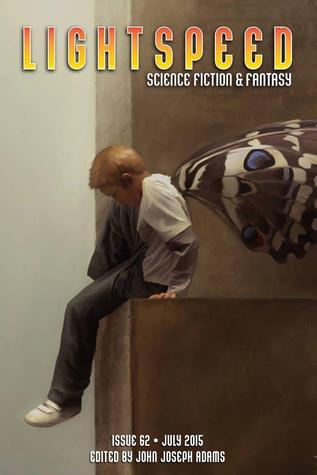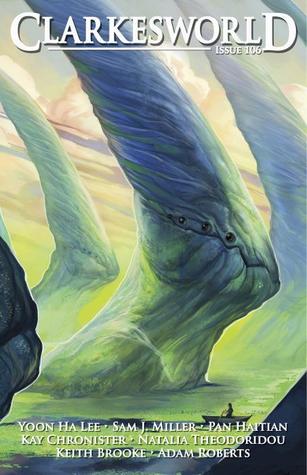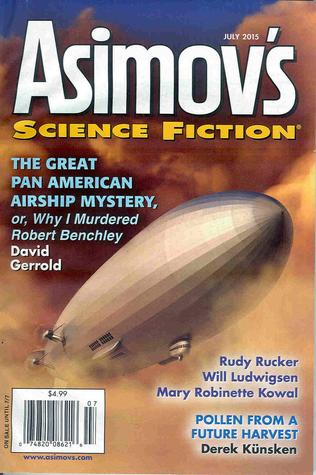Short Speculative Fiction: A July Round-Up
 |
 |
 |
In this column, find recommendations for short speculative fiction from Lightspeed (July 2015), Clarkesworld (July 2015) and Asimov’s (July 2015).
“When Your Child Strays from God”
by Sam J. Miller
Clarkesworld 106
This delightful short story is the 1st person account of Bethesda Wilde, an account prepared for the e-mail bulletin of Grace Abounding Evangelical Church. In order to save her son from a life of sin, Beth goes “webslinging” (i.e., takes a drug that puts her in a shared hallucination with her son). Madness ensues. Much of the story’s delight comes from the hallucinatory imagery: inventive, funny, and creepy. Sam J. Miller’s writing bounds from one sentence to the next with tremendous energy and confidence. Aside from the insane web world, the story possesses a sincere emotional core and I found it quite moving in the end. Beth is a memorable and multidimensional character: hilarious, lovable (sometimes hateful), and with a good head for science. She has a few secrets of her own up her sleeve.
“Acres of Perhaps”
by Will Ludwigsen
Asimov’s Science Fiction, July 2015
So imagine a slightly more avant-garde Twilight Zone (e.g., a thirty-minute one-shot image of a woods, with goblins slowly emerging from the leaves). The people behind the show: the dependable (if staid) writer and the drunken maverick with flashes of genius. This novelette tells of the downfall of this TV show through a strange series of eerie hijinks. It has strains of the Salieri/Mozart story (mediocrity confronts genius), but really it’s more insightful and complex than that. The characters feel alive, and the story has real emotional punch. I especially admired the way it covers decades of significant character transformation without feeling rushed. This is really a story with heart.
“Android Whores Can’t Cry”
by Natalia Theodoridou
Clarkesworld 106
This strange short story has many lovely elements in its world-building: androids, nacre (the stuff of pearls), death meditations, and a Massacre Market. It has a meta-fictional feel, as it’s comprised of over a dozen different pieces that a journalist assembles in writing a story. The journalist struggles over exactly how to tell the story in words that embody both the piece of fiction itself and the plausible voice of the main character, e.g.,: “Note to self: People need the historical and political background of the story to make sense of any of these.” The narrative is comprised of false starts and do-overs, and yet the story builds with power and vividness to a surprising and hauntingly ambiguous conclusion.
“Pollen From a Future Harvest”
by Derek Künsken
Asimov’s Science Fiction, July 2015
So this novella has an insane amount of world-building: vegetable intelligences, worm-holes that link the same space across 11 years of time, a complicated triptych marriage society, interstellar political intrigue: and add to wit it’s a mystery as the protagonist tries to determine who killed her husband. There’s a hell of a lot of exposition here, but I found the world truly fascinating and I enjoyed the unexpected twists and turns of the plot. It worked even better for me on a second reading.
“The Hunger Tower”
by Pan Haitian
Clarkesworld 106
This short story opens with a splendid visual image: “In the west-slanting light of the three suns, the tower stood out as a long, thin line of light against the gloomy mountains that cluttered around on four sides.” Written in 2003 and translated from Chinese for the first time here, the story has an allegorical feel. Characters are referred to by occupation: the captain, the chemistry professor, the priest (being named is almost a guarantee of being killed in this story). Crash-landed on an alien planet, these people are fully stripped of their past lives and struggle to survive in the Hunger Tower. The imagery is lovely throughout, and it has a misty supernatural quality with a veneer of science.
“Violation of the Trunet Security Act”
by Taiyo Fuji
Lightspeed, July 2015
Originally published in Japanese in 2013, this novelette is translated for the first time here. It starts out as a zombie story: but the zombies are computer programs, relics of the Internet in an age where humans have created a Truant to protect themselves from the berserk actions of the Internet. A lot of this story is told in code, and it takes a lot of pleasure in PHP and keyboards, but somehow still manages to be a thrilling ride.
Black Gate covers all the major fantasy magazines. Check out the Black Gate August Fantasy Magazine Rack here, and all our current magazine coverage — with updates on 27 ongoing publications — is here.
Learned Foote’s last article for us was Short Speculative Fiction: A May Roundup.